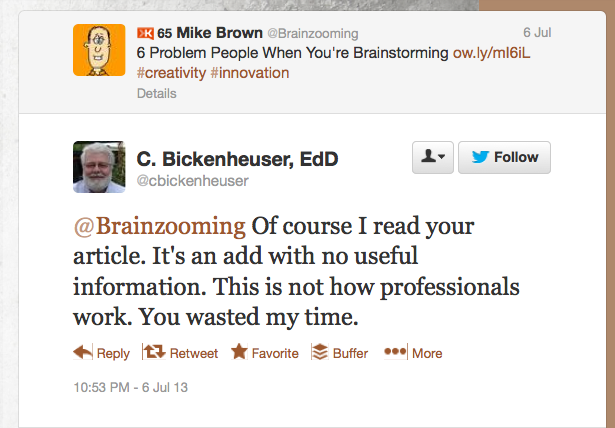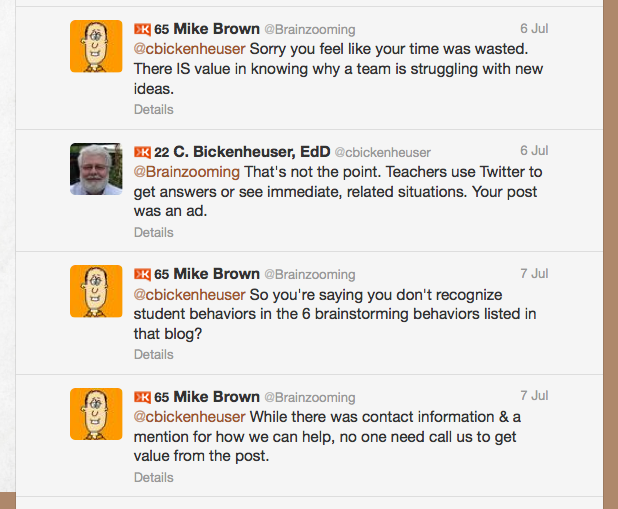Should A Sales Pitch Cost Your Blog Subscribers?
By Alex Greenwood
Years ago, when dinosaurs walked the earth, I was editor of a small town newspaper. Part of my job was keeping up community relations, and the best way to meet people and do some positive things in our town was through the Kiwanis Club. The Kiwanis motto then was “We Build,” and they certainly did–whether it was collecting used eyeglasses for the needy or raising money for iodized salt, (Note: In 2005 the organization chose a new motto, “Serving the Children of the World.”)
Kiwanians worldwide are great people. Sure, the meetings were corny–singing old songs and backslapping, hail-fellow-well-met kind of stuff, but it built relationships, put people at ease and made for a fun lunch. It was civility with good citizenship.
At its core, Kiwanis was about the business of building a better community, not making sales pitches. One rule of our chapter was strictly enforced: mention your business, try to make a sale or do anything remotely commercial and you’d pay a fine of one dollar for the privilege. I learned the hard way when I told a fellow complaining about the other newspaper in town that he should buy an ad from my newspaper.
Cha-ching! That will be one dollar in the hat, Alex.
I was reminded of Kiwanis when I saw an exchange between my friend (and sometimes client) Mike Brown of The Brainzooming Group and a gentleman on Twitter:
The man, apparently an educator, took issue with a post by Mike, who is one of the most successful, prolific bloggers going, about “6 Challenging Types to Manage in Brainstorming Sessions.” I enjoyed that post, because as usual, Mike spoke truth, imparted information and injected a little humor into my day. Well, the post ended with Mike making a bit of a sales pitch:
If you expect these challenging types will struggle generating concepts and ideas in your organization, let’s talk to help think through planning brainstorming sessions that will contribute to your organization’s objectives.
That line rubbed the gentleman the wrong way. As you can see, he questioned Mike’s professionalism and denounced him for wasting his time. Mike responded:
Mike handled that very well. He’s right. He offered valuable information and just because he offered contact info at the end doesn’t negate that.
When I saw this exchange, my first impression was, who died and made this person arbiter of what you can or cannot do on Twitter or your blog? A teacher with a typo in his Tweet, no less, is calling Mike Brown unprofessional?
Talk about people in glass schoolhouses throwing erasers!
Free Advice Isn’t Always Free, Nor Should It Be
Mike Brown has published more than 1,500 posts to his blog. He’s a nationally respected expert on ideation and creativity. He and his business partners are generous with their knowledge. That may have something to do with why he has 16,500+ Twitter followers.
If you’re a regular Brainzooming blog reader, you’re getting a daily course in ways to improve your business, and you get it free. Sorry to disagree with the gentleman, but blogs like Mike’s are more than just clearinghouses for free information, they are also showcases for expertise that may help you decide to hire a person or firm. By extension, Twitter is a way to direct people to a blog or a place to have conversations with friends, colleagues and yep, potential clients/customers. It’s not (just) a 140-character Wikipedia or help desk.
I asked Mike if he always puts a sales pitch in his posts. He said no, and added that lately he does it more often, and has lost a few subscribers. That’s anecdotal, but it could lead you to believe that at least a few others feel the way the teacher apparently does: what you post on your blog–your valuable, experienced advice and opinions–should be free with no strings attached. Any attempt to make a sales pitch should be rewarded with an “unsubscribe.”
Well, I don’t buy it, if you’ll pardon the pun.
If you’re a regular reader of this blog or my Twitter feed, then you know three things:
1. I’m an experienced, successful PR pro who has opinions and tips about Public Relations and related topics.
2. I’m the author of four books. I want you to buy them, read them and review them.
3. I’d be honored if you hired my firm for your PR, crowdfunding, social media and e-publishing needs.
I make no apologies. Twitter, blog posts and other sharing platforms are not an online Kiwanis Club.
Certainly, you can offer your experience, advice and opinions with no hope of getting anything in return–that is your right. However, as a businessperson, I reserve the right to share my valuable information and experience with an occasional request that you hire me.
I also believe I can ask people on Twitter to sample/buy my books. I try not to do it every day, and I try not to do it more than once or twice (per title) in a 24-hour period. (However, if I’m in the midst of a time-sensitive sale imposed by Amazon, Lulu, Smashwords, etc., I put the word out more often so I don’t miss anybody who might want to buy a book on sale.) If this turns people off and they unsubscribe or stop following me, so be it.
What’s The Ratio of Content to Sales?
What’s the right mix of info to sales pitch? Hard to say. I say keep the sales-related stuff to around 20% of your content, but everyone is unique. You’ll know it when you get more unsubscribes/unfollows than you do subscribers/followers.
Just remember, these are my opinions based on my experience. I offer them to you free of charge and unhindered by a sales pitch.
Wither the Kiwanis Club?
I’d close this lengthy post with a suggestion that there is one aspect of our online sharing that should be like a Kiwanis Club: civility.
It’s one thing to think someone needs to let the foot off the gas on the sales talk, but quite another to call them unprofessional in public because they offended your personal code of How It Should Be on Twitter.
Now put a dollar in the hat.


